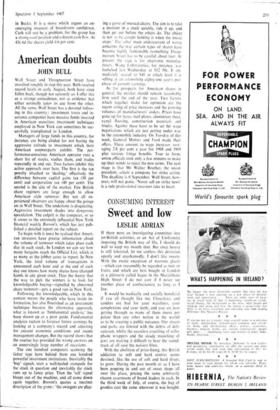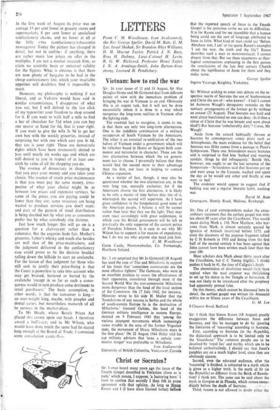Sweet and low
CONSUMING INTEREST LESLIE ADRIAN
If there were an investigating committee into un-British activities, or an Act of Uniformity imposing the British way of life, I should do well to keep my mouth shut. But since heresy is still tolerated, let me confess this deviation openly and unashamedly. I don't like sweets. With the exotic exception of marrons glaces —which can reasonably be regarded as nuts or fruits, and which are best bought in London at a patisserie called Sagne in the Marylebone High Street—I do not care if I never see another piece of confectionery as long as I live.
It would be medically and socially beneficial if you all thought like me. Chocolates and candies are bad for your waistlines, your complexions and your teeth; and you are now getting through so many of them (more per palate than any other nation in the world) as to be creating a public nuisance. Our streets and parks are littered with the debris of deli- catessen, whilst the ceaseless crackling of cello- phane wrappers and the steady munching of jaws are making it difficult to hear the sound- track of all save the noisiest films.
With the abolition of price-fixing, this British addiction to soft and hard centres seems destined, like the use of soft and hard drugs, to grow. During the past month or so I have been popping in and out of sweet shops all over the place, pricing the same arbitrarily chosen assortment of brand leaders in each. In the third week of July, of course, the bag of goodies cost the same wherever it was bought. In the first week of August its price was on average 15 per cent lower 'at grocery stores and supermarkets, 8 per cent lower at specialised confectionery chains, and no lower at all at the little C1NS (confectionery-tobacconist newsagents). Today the picture has changed in detail, but not in outline: if anything, there are rather more low prices on offer in the multiples. I am not a market research firm, so claim no scientific basis or universal validity for the figures. What is obvious is that there are now plenty of bargains to be had in the cheap confectionery line, which your insatiable appetites will doubtless find it impossible to resist.
However, my philosophy is nothing if not liberal, and as Voltaire would have said in similar circumstances, I disapprove of what you eat, but I will defend to the last click of my typewriter your freedom to shop around for it. If you want to walk half a mile to find a bar of chocolate for 51d when you can buy one nearer at hand for 6d, that is your right. If you want to give the wife 3s 9d to get her own box with the weekly groceries, instead of surprising her with one which cost you 4s 6d, that too is your right. These are democratic rights which have been strenuously denied to you until nearly six weeks ago and which are still denied to you in respect of at least one- sixth by value of all the shopping you do.
The essence of democracy in shopping is that you pays your money and you takes your choice. The essence of resale price maintenance is that you must pay the same money, irres- pective of what your choice might be as between low prices and expensive services. So some of the prices you are paying could be lower than they are; some resources are being wasted to produce services you don't want; and part of the pattern of retail distribution is being decided not by what you as consumers prefer but by what somebody else dictates.
Just how much longer this will go on is a question for a clairvoyant rather than a columnist. But the auguries bode fair. Mother's groceries, father's whisky and much else besides are well shot of the price-maintainers, and the judgment delivered in the confectionery case could prove to be the decisive boulder rolling down the hillside to start an avalanche. For the lesson of that judgment for those who still seek to justify their price-fixing is that the Court is powerless to take into account who may get bruised, battered or buried by the avalanche 'except in so far as such a conse- quence would in turn produce some detriment to retail purchasers.' The basic assumption, in other words, is that the consumer is king— an over-weight king, maybe, with pimples and dental caries, but nevertheless monarch of all he surveys in the market-place.
To Mr Heath, whose Resale Prices Act placed this crown upon our heads, I therefore award a bull's-eye; and to Mr Wilson, who would have done much the same had he stayed long enough at the Board of Trade, I commend some consolation candy-floss.































 Previous page
Previous page